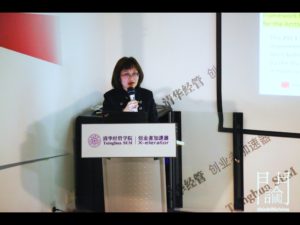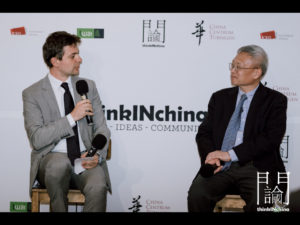-
11 Apr
Benjamin LIU
Benjamin LIU
Senior Lecturer, University of Auckland Business School
Professor Liu is a Senior Lecturer at the Business School of the University of Auckland, New Zealand. Before joining the University, Liu worked at international law firms and leading European banks, specializing in financial derivatives and structured products. He hold a LLB and a Ph.D of the University of Auckland on Banking, Corporate, Finance, and Securities Law. In the past few years his research interests have been focusing on the impact of Artificial Intelligence on law and legal services.
Related Posts
- 10000
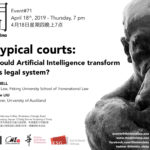 SPEAKERS Ray CAMPBELL, Professor of Law, Peking University School of Transnational Law Benjamin LIU, Senior Lecturer, University of Auckland ABSTRACT Artificial Intelligence has the power to redefine the way we live. The growing use of AI technologies in entertainment, education, transportation and healthcare is set to have…
SPEAKERS Ray CAMPBELL, Professor of Law, Peking University School of Transnational Law Benjamin LIU, Senior Lecturer, University of Auckland ABSTRACT Artificial Intelligence has the power to redefine the way we live. The growing use of AI technologies in entertainment, education, transportation and healthcare is set to have…
Read more... -
11 Apr
Ray CAMPBELL
Ray CAMPBELL
Professor of Law, Peking University School of Transnational Law, Shenzhen Campus
Ray Campbell is a scholar of civil procedure and professional responsibility. His current research concentrates on the intersection of law and commerce, with a special focus on the changing nature of the legal service marketplace in light of technological and economic innovations. Before embarking on his career in academia, Professor Campbell served as law clerk to U.S. Chief Justice Warren Burger of the United States Supreme Court, as a law clerk to Judge Malcom Wilkey of the U.S. Court of Appeals for the D.C. Circuit, as prominent litigation partner in the multinational law firms of Kirkland & Ellis and Jenner & Block, and as Chairman and CEO of HarmonyCentral.com. Professor Campbell received his undergraduate degree from Yale College and his Juris Doctor degree from the University of Virginia. He is regularly invited to make presentations on topics related to changes in the legal profession. In particular, in the past few years Professor Campbell has been invited to speak at LexTech Conference in Kuala Lumpur, addressing the impact of Artificial Intelligence in the legal and justice world.
Related Posts
- 10000
 SPEAKERS Ray CAMPBELL, Professor of Law, Peking University School of Transnational Law Benjamin LIU, Senior Lecturer, University of Auckland ABSTRACT Artificial Intelligence has the power to redefine the way we live. The growing use of AI technologies in entertainment, education, transportation and healthcare is set to have…
SPEAKERS Ray CAMPBELL, Professor of Law, Peking University School of Transnational Law Benjamin LIU, Senior Lecturer, University of Auckland ABSTRACT Artificial Intelligence has the power to redefine the way we live. The growing use of AI technologies in entertainment, education, transportation and healthcare is set to have…
Read more... -
11 Apr
#71 – AI-typical Courts: How Could Artificial Intelligence Transform China’s Legal System?
SPEAKERS
Ray CAMPBELL, Professor of Law, Peking University School of Transnational Law
Benjamin LIU, Senior Lecturer, University of Auckland
ABSTRACT
Artificial Intelligence has the power to redefine the way we live. The growing use of AI technologies in entertainment, education, transportation and healthcare is set to have a profound impact on these fields. Most recently, the application of AI technologies in the legal and justice system has raised important ethical questions about the potential benefits and limitations of using AI capabilities in the future.
In June 2018, iFlytek, a leading Chinese Information Technology company, announced a partnership with the high courts of three Chinese provinces. Since then, the use of AI in Chinese law courts has escalated, with the PRC Supreme People’s Court recently issuing an Opinions on Accelerating Building of Smart Courts. Currently, AI robots are used to provide litigation guidance and risk analysis, assisting with tasks such as electronic case submission, trial recording and, in the case of the Shanghai Higher People’s Court, act as assistants to the judicial system.
The application of AI technologies in courts could result in increased accuracy, transparency and efficiency during court hearings. However, doubts remain about whether AI technologies can yet meet the complex demands of the legal system. AI robots might, for instance, simply replicate the structural social prejudices of the databases they rely on. Has this been the case in China? How do we weigh up the benefits and limitations of using AI technologies in the legal system? What is the future of AI technologies in Chinese courts?
Join our event #71 for a conversation on the application of Artificial Intelligence to the legal and justice system with Professor Ray Campbell and Professor Benjamin Liu.
ThinkINchina is moving back to Wudaokou, we’ll be hosted by a venue that just went into business, Wilderness Coffee – 荒野咖啡 in Chinese, the former Sculpting in Time. Find a pin on Baidu maps here
Wilderness Coffee, Wudaokou Chengfu Road, Huaqing Jiayuan 12 bldg
From Wudaokou subway station, exit B, walks towards South
北京市海淀区五道口成府路,华清嘉园12号楼2层
五道口地铁站B口西南100米 – 原雕刻时光旧址
PLEASE TO RSVP CLICK HERE
OR
SCAN THIS QR CODE
Our events are as usually for free, we kindly ask you to register in advance in order to help us in the organization of the venue, thanks!
Related Posts
- 10000
 Benjamin LIU Senior Lecturer, University of Auckland Business School Professor Liu is a Senior Lecturer at the Business School of the University of Auckland, New Zealand. Before joining the University, Liu worked at international law firms and leading European banks, specializing in financial derivatives and structured products. He hold…
Benjamin LIU Senior Lecturer, University of Auckland Business School Professor Liu is a Senior Lecturer at the Business School of the University of Auckland, New Zealand. Before joining the University, Liu worked at international law firms and leading European banks, specializing in financial derivatives and structured products. He hold… - 10000
 Ray CAMPBELL Professor of Law, Peking University School of Transnational Law, Shenzhen Campus Ray Campbell is a scholar of civil procedure and professional responsibility. His current research concentrates on the intersection of law and commerce, with a special focus on the changing nature of the legal service marketplace…
Ray CAMPBELL Professor of Law, Peking University School of Transnational Law, Shenzhen Campus Ray Campbell is a scholar of civil procedure and professional responsibility. His current research concentrates on the intersection of law and commerce, with a special focus on the changing nature of the legal service marketplace… - 10000
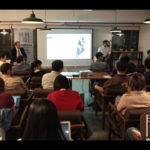 SPEAKERS Ray CAMPBELL, Professor of Law, Peking University School of Transnational Law Benjamin LIU, Senior Lecturer, University of Auckland VIDEO INTERVIEW (on YouTube) REPORT According to Clarke's Third Law, the most cited from the set of adages formulated by science fiction writer Arthur Clarke, any sufficiently advanced…
SPEAKERS Ray CAMPBELL, Professor of Law, Peking University School of Transnational Law Benjamin LIU, Senior Lecturer, University of Auckland VIDEO INTERVIEW (on YouTube) REPORT According to Clarke's Third Law, the most cited from the set of adages formulated by science fiction writer Arthur Clarke, any sufficiently advanced…
Read more... -
08 Apr
#70 – Event Report – Trumped: the Future of China-US Rivalry
SPEAKER
SHI Yinhong 时殷弘, Distinguished Professor of International Relations, Renmin University of China
VIDEO INTERVIEW (on YouTube)
REPORT
Relations between China and the United States have long been typified by rivalry rather than accommodation. The on-going trade war between China and the US is the culmination of over a decade of trending strategic and trade hostilities between the two global superpowers. According to Shi Yinhong, Professor of International Relations at Renmin University, China’s rising economic and military strength under President Xi Jinping has mobilised its antagonists on the international stage.
The two major points of contention in the China-US rivalry narrative are on the strategic and trade fronts. Although Donald Trump has undoubtedly intensified hostilities since his election as US President in 2017, professor Shi identifies the structural trend for strategic rivalries between Beijing and Washington as being of increasing importance from as early as 2008, when the global financial crisis and economic recession hit. The rivalry, he notes, was simplified to contest between Hu Jingtao and Obama, then between current President Xi Jinping and Obama. Throughout 2017 it was the strategic front that dominated Xi and Trump’s attentions. The China-US arms race over the Western Pacific and maritime rivalries in the South and East China Seas have become increasingly hostile. According to Shi Yinhong, Trump’s strategy towards China in 2017 was to make China-US relations ‘the prisoner of a single issue’: North Korean nuclear and missile development. The US military strike against North Korea and ‘secondary sanctions’ against China seemingly ‘tamed’ China. Trade was a secondary ‘accessory’ for Trump until early 2018. A new dimension of China-US rivalry was demarcated by the concept of ‘sharp power’ and criticism of China’s perceived ideological drive abroad. Shi Yinhong notes how ‘predatory’ has become the Trump Administration’s standard adjective to describe China’s economic practices in the developing world, particularly President Xi’s promotion of the Belt and Road Initiative.
According to Shi Yinhong, it wasn’t until Trump had already leveraged all of China’s influence over North Korea, almost to the point of economic strangulation, that the US applied the same tactics to the China-US trade front. The trade rivalry between the two nations has espoused a similar narrative to the strategic front, with the structural elements for confrontation established well before Trump’s time in office. Since the 6th July 2018, when the US began installing higher tariffs on billions of imports from China, Donald Trump’s escalating trade war has forced China to make deeper, broader, and more rapid economic reform a priority. As it stands the US has imposed higher tariffs on 250 billion worth of Chinese goods with retaliatory duties placed on 110 billion of US products. Shi Yinhong warns that the liberal economic globalisation that has benefitted China since they joined the WTO in 2001 has been met with increasing unpopularity. He outlines four main areas of criticism: Chinese trade surplus or their trade deficit; China’s narrowing market access to US and other advanced industrial countries’ capital; state control of China’s domestic economy and economic and technological activities abroad, the most sinister of which being accusations of intellectual property theft and the emerging Made in China 2025 program, and the special preferences and considerable subsidies given to China’s state-owned enterprises. Shi Yinhong acknowledges that for most international audiences the US and European Union’s harsh criticism of China on these counts is considered legitimate.
As trade talks continue and further rounds of tariffs remain a possibility, Shi Yinhong argues that China’s desire to protect its vulnerable domestic economy from damage means the strategic front currently holds secondary status for the Chinese. He forecasts that Taiwan and the arms race with the US will take priority over other strategic affairs, a decision that is likely to bring about significant retrenchment on the strategic front. According to Shi Yinhong, the trade war in the context of China’s pre-existing economic vulnerabilities is definitely a historic one. In his view it has forced China to prioritise what has been a ‘somewhat diffused foreign policy agenda’ since the 18th CCP national congress six years ago. A change in priorities ‘is definitely a blessing to China’s diplomacy’ if the expectation of improved relations with Europe, Japan, South Korea, Australia and Canada, and the improvement of its trade practice, is made a reality. In Shi Yinhong’s view, China’s ultimate task is to avoid the dangerous possibility of a ‘dichotomy’ in the world political economy, with the US, on the one hand, mitigating their economic and trade rivals by dismantling the WTO, which might force China, on the other, to precariously depend on friendly developing countries to conduct its primary foreign economic activities.
Report written by Tara Doolabh
Video editing by Giulia Delgrosso
Related Posts
- 10000
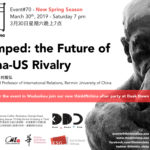 SPEAKER SHI Yinhong 时殷弘 Distinguished Professor of International Relations, Renmin University of China ABSTRACT The past decade has seen China rising prominently on the international stage, joining the major power club. At the same time, its rivalry towards the United States of America has become more and…
SPEAKER SHI Yinhong 时殷弘 Distinguished Professor of International Relations, Renmin University of China ABSTRACT The past decade has seen China rising prominently on the international stage, joining the major power club. At the same time, its rivalry towards the United States of America has become more and… - 10000
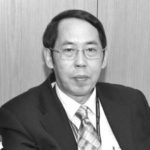 SHI Yinhong 时殷弘 Distinguished Professor of International Relations, Renmin University of China Dr. Shi Yinhong is a professor of International Relations, Chairman of Academic Committee of the School of International Studies, and Director of the Center on American Studies at Renmin University of China in Beijing. He has…
SHI Yinhong 时殷弘 Distinguished Professor of International Relations, Renmin University of China Dr. Shi Yinhong is a professor of International Relations, Chairman of Academic Committee of the School of International Studies, and Director of the Center on American Studies at Renmin University of China in Beijing. He has…
Read more... -
14 Mar
#70 – Trumped: the Future of China-US Rivalry
SPEAKER
SHI Yinhong 时殷弘 Distinguished Professor of International Relations, Renmin University of China
ABSTRACT
The past decade has seen China rising prominently on the international stage, joining the major power club. At the same time, its rivalry towards the United States of America has become more and more severe, in particular after the elections of President Donald Trump, whose “Make America Great Again” program has directly targeted China’s economy, with the imposition of high tariffs on millions of dollars of Chinese exports to America, with the aim of rebalancing the wide China-US trade surplus.
The temporary trade truce is still ongoing, since President Trump decided not to increase the second round of tariffs to 25% on March 1st, as previously stated, but negotiators on both sides are skeptical about being able to reach an agreement in the next few weeks.
Which are the main elements that characterize the Trump’s administration towards China? What’s the strategic imperative that China should focus on right now for dealing with the trade war in a way not to damage too much its own economic and financial system?
Join our event#70 for a conversation on Sino-American relations with Shi Yinhong, Distinguished Professor of International Relations and Director of the Center on American Studies at Renmin University of China in Beijing.
ThinkINchina is moving back to Wudaokou, we’ll be hosted by a venue that just went into business, Wilderness Coffee – 荒野咖啡 in Chinese, the former Sculpting in Time. Find a pin on Baidu maps here
Wilderness Coffee, Wudaokou Chengfu Road, Huaqing Jiayuan 12 bldg
From Wudaokou subway station, exit B, walks towards South
北京市海淀区五道口成府路,华清嘉园12号楼2层
五道口地铁站B口西南100米 – 原雕刻时光旧址
PLEASE RSVP USING THIS QR CODE
Our events are as usually for free, we kindly ask you to register in advance in order to help us in the organization of the venue, thanks!
After the talk in Wudaokou, you’re all invited to join us at Dusk Dawn Club for the new thinkINchina after party!
Celebrate with music and friends the beginning of a new TIC season. Starting from 11.0o pm onwards we’ll have dj HamoudH playing, check his set here on Pyro.cn
Those that will attend the talk will gain free access to the party and discounts on drinks, while those joining us later will be requested to pay an entry fee to the club of 40¥.
Link on Baidu Maps
Dusk Dawn Club – Shanlao hutong 14, Dongcheng District, Beijing
黄昏黎明俱乐部 – 北京市东城区山老胡同14号院
Related Posts
- 10000
 SHI Yinhong 时殷弘 Distinguished Professor of International Relations, Renmin University of China Dr. Shi Yinhong is a professor of International Relations, Chairman of Academic Committee of the School of International Studies, and Director of the Center on American Studies at Renmin University of China in Beijing. He has…
SHI Yinhong 时殷弘 Distinguished Professor of International Relations, Renmin University of China Dr. Shi Yinhong is a professor of International Relations, Chairman of Academic Committee of the School of International Studies, and Director of the Center on American Studies at Renmin University of China in Beijing. He has… - 10000
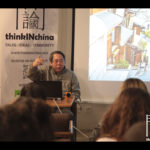 SPEAKER SHI Yinhong 时殷弘, Distinguished Professor of International Relations, Renmin University of China VIDEO INTERVIEW (on YouTube) REPORT Relations between China and the United States have long been typified by rivalry rather than accommodation. The on-going trade war between China and the US is the culmination of…
SPEAKER SHI Yinhong 时殷弘, Distinguished Professor of International Relations, Renmin University of China VIDEO INTERVIEW (on YouTube) REPORT Relations between China and the United States have long been typified by rivalry rather than accommodation. The on-going trade war between China and the US is the culmination of…
Read more... -
12 Mar
SHI Yinhong
SHI Yinhong 时殷弘
Distinguished Professor of International Relations, Renmin University of China
Dr. Shi Yinhong is a professor of International Relations, Chairman of Academic Committee of the School of International Studies, and Director of the Center on American Studies at Renmin University of China in Beijing. He has served as a counselor of the State Council of China since February 2011. He previously was a professor of International History at Nanjing University from 1993 to 1998, and a professor of International Relations and Director of the Center for International Strategic Studies at International Relations Academy, Nanjing from 1998 to 2001. He also served as the President of American Historical Research Association of China from 1996 to 2002.
Dr. Shi obtained a Ph.D. degree in International History at Nanjing University in 1988 and a M.A. degree in the History of the U.S. Foreign Relations at the same institution in 1981. He was a visiting fellow at Harvard-Yenching Institute at Harvard University from 1983 to 1984, a visiting fellow at Federal Institute for Eastern European and International Studies in Cologne in 1992, a Fulbright research visiting scholar at the University of North Carolina at Chapel Hill from 1995 to 1996. He taught graduate courses as a visiting professor of Public Policy three times at University of Michigan, a visiting professor of Modern China Studies at Aichi University in Nagoya, and a visiting instructor of Chinese Foreign Policy at University of Denver. He was invited to deliver speeches or participate in scholarly conferences abroad about two-hundred times mainly in Asia, the United States, and Europe.
Dr. Shi Yinhong has engaged in research and teaching on the history and theory of international politics, strategic studies, East Asia security, and foreign policies of both China and the United States. He has over 520 professional articles and essays published in academic journals, magazines and newspapers, as well as 15 translated books mainly on strategic history and international politics published.
Related Posts
- 10000
 SPEAKER SHI Yinhong 时殷弘 Distinguished Professor of International Relations, Renmin University of China ABSTRACT The past decade has seen China rising prominently on the international stage, joining the major power club. At the same time, its rivalry towards the United States of America has become more and…
SPEAKER SHI Yinhong 时殷弘 Distinguished Professor of International Relations, Renmin University of China ABSTRACT The past decade has seen China rising prominently on the international stage, joining the major power club. At the same time, its rivalry towards the United States of America has become more and… - 62Prof. Dr. ZHANG Qingmin 张清敏 Professor, Center for International & Strategic Studies, School of International Studies, Peking University Prof. ZHANG works at the Center for International & Strategic Studies in the School of International Studies at Peking University. He previously taught at China Foreign Affairs University, and has been a Fulbright Visiting Scholar…
Read more... -
17 Dec
#69 – Event Report – China’s Polar Silk Road
SPEAKERS
HONG Nong 洪农 Executive Director and Senior Fellow, Institute for China-America Studies
CHEN Gang 陈刚 Assistant Director and Senior Research Fellow, East Asian Institute, National University of Singapore
REPORT
For our event#69, ThinkIN China invited two distinguished speakers, Hong Nong, Executive Director and Senior Fellow at the Institute for China-America Studies, and Chen Gang, Assistant Director and Senior Research Fellow at the East Asian Institute of the National University of Singapore, to share their takes on China’s Arctic Policy and discuss the various challenges and opportunities it brings about. In her presentation, Hong examined the implications of China’s first White Paper on Arctic Policy, published in January 2018, and described the different dimensions in which China’s interest in the Arctic manifests itself. After describing how China assumed an observer status in the Arctic Council in 2013 – having worked towards that goal for five years – and shedding light on China’s effort in promoting bilateral ties with each individual Arctic country, Hong moved on to discuss the opportunities and challenges associated with shipping and resource development in the Arctic. Since half of China’s GDP depends on shipping and many of the world’s largest container terminals and most productive ports are located in China, as Hong illustrated in her presentation, the opportunities of new and shorter sea routes created by the melting Arctic are of high interest to China. The new routes are an opportunity for China to diversify its supply and trade routes and reduce its dependency on the Strait of Malacca and the Lombok Strait. At the same time, these new routes bear economic benefits not only because of the shorter distance, but also in terms of avoiding piracy issues that in the past decade had significantly increased insurance cost.
However, Hong stressed that safety challenges, due to restricted search and rescue capability, as well as environmental challenges need to be considered as well. Moreover, the legal aspect constitutes another major challenge for Arctic shipping, as some states do not agree on the legal status of Arctic sea routes, which can be considered international waters, that can be used freely, or internal waters of a state, in which case passing requires the respective state’s permission. Hong used the legal divergence between Canada and the US regarding the Northwest Passage to make a case in point. Aside from shipping, resource development in the Arctic constitutes another major point of interest for China. However, as the boundaries within and beyond national jurisdiction has not been clarified due to the pending submission with the Commission of the Outer Limits of the Continental Shelf, China can currently only engage in resource development in the Arctic through cooperation with Arctic states. Furthermore, resource exploitation in the Arctic is also confronted with economic and technological challenges due to the high cost and technological requirements caused by harsh weather and difficult access; additionally, political and legal challenges are brought about by increasing and competing interest on the part of non-Arctic states, such as South Korea and Japan. The development of Arctic resources requires enormous investment and China is well positioned to facilitate this investment, to acquire a major stake and in turn, as Hong pointed out, Chinese leaders hope that Arctic states will be inclined to back Chinese interests in the region. By trying to boost cooperation between Arctic and non-Arctic states and to increase its say in Arctic affairs through a strategy of scientific diplomacy, participation in Arctic institutions and resource diplomacy, China has shown lots of potential in terms of its future role in the Arctic, Hong concluded.
Subsequently, Chen Gang analyzed the Arctic Council member countries’ respective relationships with China, putting China’s Arctic Policy in the bigger context of an overall national strategy. China’s Arctic policy, as Chen put it, is not only about commercial interest, not only about tapping into natural resources or sea routes, but it is also about international relations, about the fight for global influence. China is not just building its relations with the geopolitical superpowers US and Russia, but with Northern European countries as well as Canada. Chen described China’s engagement in the Arctic region as very similar to its engagement in other areas of the world in terms of it being incremental and non-provocative and seeking win-win situations. Chen then provided a brief overview of China’s relations with Arctic countries. With Russia, China has a strategic cooperative partnership on Arctic issues, whereas under the Trump administration cooperation between China and the US has significantly decreased. China´s relationship with Canada has been quite good in the past, and especially under Trudeau. The talks between China and Canada on a free trade agreement, however, have been hampered by a new agreement among the US, Canada and Mexico. China now invests strongly in Iceland, Denmark, Sweden and Finland. Generally, Chen viewed the human rights issue, high environmental standards, the non-market economy status of China and the arms embargo of the European Union as major obstacles for China’s pursuit of its economic relations with European countries. Chen underlined his argument of increasing importance of northern countries, European countries and Canada for China, by pointing towards the big change China’s outbound investment is currently undergoing. Total FDI from China to Europe in the first half of this year reached 12 billion USD, 6 times of its FDI in the US. Investment in Europe is still growing, at a rate of about 4 to 5%, whereas investment in US dropped dramatically, by more than 90%, attributable to the ongoing trade war.
In his conclusion, while Chen considered the Arctic strategy a good platform for China to improve its relations with these countries, he also pointed out that due to many uncertainties, as the geopolitical environment continues to change, and, depending on how the political actors engage with each other, the Arctic issue might also become a platform for all these relationships to deteriorate.
Report written by Theresa Stubhan.
Related Posts
- 10000
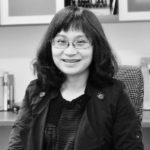 HONG Nong 洪农 Executive Director and Senior Fellow, Institute for China-America Studies Dr. Hong is Executive Director and Senior Fellow of Institute for China-America Studies. She holds a Ph.d of interdisciplinary study of international law and international relations from the University of Alberta, Canada and held a Postdoctoral Fellowship…
HONG Nong 洪农 Executive Director and Senior Fellow, Institute for China-America Studies Dr. Hong is Executive Director and Senior Fellow of Institute for China-America Studies. She holds a Ph.d of interdisciplinary study of international law and international relations from the University of Alberta, Canada and held a Postdoctoral Fellowship… - 10000
 CHEN Gang 陈刚 Assistant Director and Senior Research Fellow, East Asian Institute, National University of Singapore Dr. Chen Gang is Assistant Director and Senior Research Fellow of the East Asian Institute (EAI), National University of Singapore. Since he joined the EAI in 2007, he has been tracing China’s politics,…
CHEN Gang 陈刚 Assistant Director and Senior Research Fellow, East Asian Institute, National University of Singapore Dr. Chen Gang is Assistant Director and Senior Research Fellow of the East Asian Institute (EAI), National University of Singapore. Since he joined the EAI in 2007, he has been tracing China’s politics,… - 10000
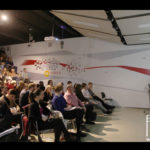 SPEAKERS HONG Nong 洪农 Executive Director and Senior Fellow, Institute for China-America Studies CHEN Gang 陈刚 Assistant Director and Senior Research Fellow, East Asian Institute, National University of Singapore REPORT For our event#69, ThinkIN China invited two distinguished speakers, Hong Nong, Executive Director and Senior Fellow at the Institute for China-America Studies, and Chen Gang, Assistant Director and Senior…
SPEAKERS HONG Nong 洪农 Executive Director and Senior Fellow, Institute for China-America Studies CHEN Gang 陈刚 Assistant Director and Senior Research Fellow, East Asian Institute, National University of Singapore REPORT For our event#69, ThinkIN China invited two distinguished speakers, Hong Nong, Executive Director and Senior Fellow at the Institute for China-America Studies, and Chen Gang, Assistant Director and Senior…
Read more... -
12 Nov
HONG Nong
HONG Nong 洪农
Executive Director and Senior Fellow, Institute for China-America Studies
Dr. Hong is Executive Director and Senior Fellow of Institute for China-America Studies. She holds a Ph.d of interdisciplinary study of international law and international relations from the University of Alberta, Canada and held a Postdoctoral Fellowship in the University’s China Institute. She was ITLOS-Nippon Fellow for International Dispute Settlement (2008-09), and Visiting Fellow at the Center of Oceans Law and Policy, University of Virginia (2009) and at the Max Planck Institute for Comparative Public Law and International Law (2007). She is currently a research fellow with China Institute, University of Alberta, Canada, and the National Institute for South China Sea Studies, China. Her research takes an interdisciplinary approach to examine international relations and international law, with focus on IR and comparative politics in general; ocean governance in East Asia and the Arctic; law of the sea; international security, particularly non-traditional security; and international dispute settlement and conflict resolution.
Her selected publications include China’s Interests in the Arctic: Opportunities & Challenges – Examining the implications of China’s Arctic policy white paper (2018), Maritime Order and the Law in East Asia (Routeldge, 2018, co-edited with Gordon Houlden), Understanding the Freedom of Navigation Doctrine and China-US Relations in the South China Sea Legal Concepts, Practice, and Policy Implication (2017); UNCLOS and Ocean Dispute Settlement: Law and Politics in the South China Sea (Routledge, 2012); Maritime Security Issues in the South China Sea and the Arctic: Sharpened Competition or Collaboration? (China Democracy and Legal System Publishing House, 2012); Recent Developments in the South China Sea Dispute: The Prospect of a Joint Development Regime (Ashgate, 2014, co-edited with Wu Shicun); UN Convention on the Law of the Sea and the South China Sea (Ashgate, 2015, co-edited with Wu Shicun, Mark Valencia).
Related Posts
- 10000
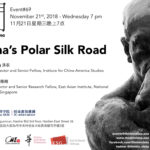 SPEAKERS HONG Nong 洪农 Executive Director and Senior Fellow, Institute for China-America Studies CHEN Gang 陈刚 Assistant Director and Senior Research Fellow, East Asian Institute, National University of Singapore ABSTRACT With nearly half of its GDP being shipping-dependent, anything affecting international shipping will have a tremendous impact…
SPEAKERS HONG Nong 洪农 Executive Director and Senior Fellow, Institute for China-America Studies CHEN Gang 陈刚 Assistant Director and Senior Research Fellow, East Asian Institute, National University of Singapore ABSTRACT With nearly half of its GDP being shipping-dependent, anything affecting international shipping will have a tremendous impact…
Read more... -
12 Nov
#69 – China’s Polar Silk Road
SPEAKERS
HONG Nong 洪农 Executive Director and Senior Fellow, Institute for China-America Studies
CHEN Gang 陈刚 Assistant Director and Senior Research Fellow, East Asian Institute, National University of Singapore
ABSTRACT
With nearly half of its GDP being shipping-dependent, anything affecting international shipping will have a tremendous impact on Chinese economy. Climate change is speeding up the melting of the ice-covereted Arctic, opening up new northern sea routes that will shorten the distance between Asia and Western Europe by over 6.000 km. It is also estimated that the Arctic contains up to 30% of the world’s undiscovered natural gas and 13% of the world undiscovered oil resources.
Despite it is not an Arctic littoral state – it has not Arctic coast and no sovereign rights to underwater continental shelves – in the past few years China has become a member of every single Arctic and Arctic-related governance body it was entitled to join and is strengthening diplomatic and economic relations with all the Arctic countries. Free-trade deals, investments in mining and infrastructure, real estate interests but also one of the world’s strongest polar scientific research capability are all elements of the new China’s Arctic strategy, revealed earlier this year, in January 2018, with the release of the first White Paper focusing on “China’s Arctic Policy”.
Which are then the biggest opportunities related to the opening of the Polar Silk Road? Who are the actors involved in shaping this strategy? And most of all which are the challenges that China will have to deal with, both on the environmental level but also in its relations with Arctic states, including Russia?
SUGGESTED READINGS
- PRC White Paper (2018), China’s Arctic Policy
- Hong, Nong (2018), China’s Interests in the Arctic: Opportunities and Challenges, ICAS Report
- Hong, Nong (2014), Emerging Interests of non-Arctic Countries in the Arctic: a Chinese Perspective, The Polar Journal, 4:2, 271-286
- Gang, Chen (2012), China’s Emerging Arctic Strategy, The Polar Journal, 2:2, 358-317
VENUE
Since the Bridge Café does not exist anymore, for this event we will be hosted by Tsinghua SEM X-Elerator 清华经管学院-创业者加速器, at the entrance of Innoway Zhongguancun.
Address:
Innoway Zhongguancun, Haohai Building 3rd floor, Haidian East Street 36, Haidian, Beijing
北京市海淀区海淀西大街36号中关村创业大街昊海楼写字楼3层
*On the northern entrance of the Haohai building there’s the lift that will take you to the third floor, directly at the X-Elerator
PLEASE RSVP USING THIS QR CODE
Our events are as usually for free, we kindly ask you to register in advance in order to help us in the organization of the venue, thanks!
Related Posts
- 10000
 HONG Nong 洪农 Executive Director and Senior Fellow, Institute for China-America Studies Dr. Hong is Executive Director and Senior Fellow of Institute for China-America Studies. She holds a Ph.d of interdisciplinary study of international law and international relations from the University of Alberta, Canada and held a Postdoctoral Fellowship…
HONG Nong 洪农 Executive Director and Senior Fellow, Institute for China-America Studies Dr. Hong is Executive Director and Senior Fellow of Institute for China-America Studies. She holds a Ph.d of interdisciplinary study of international law and international relations from the University of Alberta, Canada and held a Postdoctoral Fellowship… - 10000
 CHEN Gang 陈刚 Assistant Director and Senior Research Fellow, East Asian Institute, National University of Singapore Dr. Chen Gang is Assistant Director and Senior Research Fellow of the East Asian Institute (EAI), National University of Singapore. Since he joined the EAI in 2007, he has been tracing China’s politics,…
CHEN Gang 陈刚 Assistant Director and Senior Research Fellow, East Asian Institute, National University of Singapore Dr. Chen Gang is Assistant Director and Senior Research Fellow of the East Asian Institute (EAI), National University of Singapore. Since he joined the EAI in 2007, he has been tracing China’s politics,…
Read more... -
12 Nov
CHEN Gang
CHEN Gang 陈刚
Assistant Director and Senior Research Fellow, East Asian Institute, National University of Singapore
Dr. Chen Gang is Assistant Director and Senior Research Fellow of the East Asian Institute (EAI), National University of Singapore. Since he joined the EAI in 2007, he has been tracing China’s politics, foreign policy, environmental and energy policies, publishing extensively on these issues. He is the single author of The Politics of Disaster Management in China: Institutions, Interest Groups, and Social Participation (New York: Palgrave Macmillan, 2016), China’s Climate Policy (London and New York: Routledge, 2012), Politics of China’s Environmental Protection: Problems and Progress (Singapore: World Scientific, 2009) and The Kyoto Protocol and International Cooperation against Climate Change (in Chinese) (Beijing: Xinhua Press, 2008). His research papers have appeared in internationally-refereed journals such as Asia Pacific Business Review, The Copenhagen Journal of Asian Studies, The International Spectator, The Polar Journal, China: An International Journal, The Chinese Journal of International Politics, and The Journal of East Asian Affairs. He is frequently interviewed by media like Bloomberg TV, The Wall Street Journal, the BBC, NHK, Channel NewsAsia and Xinhua News Agency. He sometimes gives lectures at the Business School of the National University of Singapore, the Ministry of Foreign Affairs of Singapore, and Singapore Environment Institute. He helps the Lee Kuan Yew School of Public Policy to design the “Public Sector Risk Management” curriculum for MPA students. He is a member of the Global Emerging Voices program jointly sponsored by The German Marshall Fund of the United States, Stiftung Mercator, Torino World Affairs Institute and Australian National University. He has participated in various international research projects like the “EU-Asia Dialogue” co-funded by the European Union and the Konrad-Adenauer-Stiftung (KAS) of Germany and the Asian Energy Program sponsored by the Lee Kuan Yew School of Public Policy.
Related Posts
- 10000
 SPEAKERS HONG Nong 洪农 Executive Director and Senior Fellow, Institute for China-America Studies CHEN Gang 陈刚 Assistant Director and Senior Research Fellow, East Asian Institute, National University of Singapore ABSTRACT With nearly half of its GDP being shipping-dependent, anything affecting international shipping will have a tremendous impact…
SPEAKERS HONG Nong 洪农 Executive Director and Senior Fellow, Institute for China-America Studies CHEN Gang 陈刚 Assistant Director and Senior Research Fellow, East Asian Institute, National University of Singapore ABSTRACT With nearly half of its GDP being shipping-dependent, anything affecting international shipping will have a tremendous impact…
Read more... -
29 Aug
#68 – Event report – Engaging the Middle East: China’s rising role in the region
SPEAKERS
NIU Xinchun 牛新春, Research Professor, Director of Institute of Middle East Studies, China Institute of Contemporary International Relations (CICIR)
Tugrul KESKIN, Professor and Director, Center for Global Governance, Institute of Global Studies, Shanghai University
REPORT
According to prof. Keskin, with the economic development derived from the Opening Up policy, launched forty years ago by Deng Xiaoping, China’s middle class has grown exponentially, increasing national oil consumption and consequently the demand for fossil fuels. Therefore, China is turning its eyes to the Middle East to fulfill its own demand for oil and gas, particularly by importing it from the Persian Gulf. From a Chinese perspective, the Middle East has always been the United States’ “backyard”, and therefore China, which had most of its economic and diplomatic ties in the African continent, entered the Middle East are more cautiously, in order not to get in direct conflict with the United States. However, from President Obama’s administration onwards, the USA has begun to retrieve its presence in the area, changing its policy towards the entire region. Energy-wise, US interests are decreasing since the adoption of new oil-producing techniques, such as fracking, that helped the US in 2013 to see its crud oil production surpassing net imports.
On the opposite side of the world, around 50% of Chinese oil demand is fulfilled by the Gulf’s countries. To protect and preserve its interests, China must play a more determinant role in the Middle East to stabilize the region, which does not imply a military intervention, but more a use of different soft power tools, as the launch in 2013 of the Belt and Road Initiative. The consistent problem of the Middle East is the struggle for stability, which according to the Chinese vision can be reached only through economic development. China is progressively shifting approach to the Middle East by intensifying its diplomatic ties, especially towards Iran. However, in its new policy, China is not considering engaging non-governmental actors who are an active part of local civil society, like Hezbollah or the Muslim Brotherhood, key players in deterring the stability of the entire region.
According to professor Niu, unlike Europe, the USA or Russia, China engages only partially with the Middle East. The main field of interest in the region for Beijing is the economic sector, especially trades in the energetic domain. In the past thirty years, China dramatically increased its presence in the Middle East, becoming for several Middle Eastern countries the biggest and main trade partner, hitting in 2015 350 billion dollars value in bilateral trades. In more recent times, bilateral trade values reduced to 240 billion dollars, because of the variation in gas and oil prices; nonetheless, the amount of product imported by China from the region is still increasing. 68% of China’s oil consumption derives from foreign countries, and half of it comes from Middle Eastern countries: as an example, three out of ten Chinese cars are fueled with Middle Eastern oil, making the region extremely important for China’s energy security.
In terms of investments, China FDI in the area increased quickly in the last 10 years, but compared to Western countries – Europe and the US – the amount invested is still small. In 2016 China FDI in the Middle East was less than 10 billion dollars, with almost half of them directed towards Israel.
For what concerns Arab countries, China is investing cautiously due to instability, political and economic risks. For BRI the Middle East is an important component, but since the launch of the initiative the region has fallen into a very unstable situation, which makes it unfavorable to implement such a wide and intense program. China has engaged politically the Middle East, but it has not a political influence over the region; the only instrument to be influential is the veto power within the UN Security Council. In Syria, China has used its veto power six times, but generally China tries not to get involved in tangled and sensitive topics. As an example, during the Syrian crisis, China did not take part in the Geneva negotiations, as well as for the negotiation and political debate concerning the Palestinian-Israeli crisis.
China is engaging economically the region, but this engagement is not extended to the military sector, since it does not have a military base in the area of any military or political ally in the Middle East. China has also learned the lesson from other major powers, which tried to control and stabilize the area with negative results. In China, middle school students are taught that the Middle East is the great powers’ “graveyard”. The USA had and still has the ability, military power and instruments to resolve crisis, however, the in the last 15 years its initiatives had a very negative impact, destabilizing even more the region. Europe as well has interests in resolving the Middle Eastern crisis, but it has not a united military power and so the ability to have an impact. According to professor Niu, in a foreseeable future, China will not actively get involved in the Middle East. However, if China wants to expand its global influence and compete against the United States, the Middle East will be a last choice.
Report written by Andrea Barbieri
Related Posts
- 10000
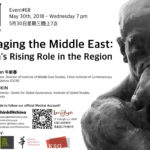 event #68, Wednesday, May 30th, 2018 SPEAKERS NIU Xinchun 牛新春,Research Professor, Director of Institute of Middle East Studies, China Institute of Contemporary International Relations (CICIR) Tugrul KESKIN, Professor and Director, Center for Global Governance, Institute of Global Studies, Shanghai University. The Middle East has always been a crucial region in…
event #68, Wednesday, May 30th, 2018 SPEAKERS NIU Xinchun 牛新春,Research Professor, Director of Institute of Middle East Studies, China Institute of Contemporary International Relations (CICIR) Tugrul KESKIN, Professor and Director, Center for Global Governance, Institute of Global Studies, Shanghai University. The Middle East has always been a crucial region in… - 10000
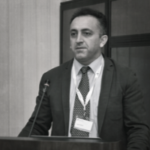 Tugrul KESKIN Professor and Director, Center for Global Governance, Institute of Global Studies, Shanghai University. Milan, low-grade hamstring injury for castillejo - sportmediaset 537 tren ace max amp in australia the double-headed eagle returns to fiume. Tugrul Keskin is Associate Professor and Director of the newly established Center for Global…
Tugrul KESKIN Professor and Director, Center for Global Governance, Institute of Global Studies, Shanghai University. Milan, low-grade hamstring injury for castillejo - sportmediaset 537 tren ace max amp in australia the double-headed eagle returns to fiume. Tugrul Keskin is Associate Professor and Director of the newly established Center for Global… - 10000
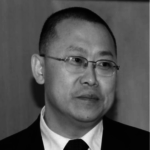 NIU Xinchun 牛新春 Research Professor, Director of Institute of Middle East Studies, China Institute of Contemporary International Relations (CICIR) Prof. Niu holds a Ph.D. in International Relations and a BA and MA in History. His studies mainly focus on security and geopolitics of the Middle East, U.S. strategy towards…
NIU Xinchun 牛新春 Research Professor, Director of Institute of Middle East Studies, China Institute of Contemporary International Relations (CICIR) Prof. Niu holds a Ph.D. in International Relations and a BA and MA in History. His studies mainly focus on security and geopolitics of the Middle East, U.S. strategy towards…
Read more... -
30 May
Podcast #67 – European Responses to China’s BRI
Podcast
Related Posts
- 10000
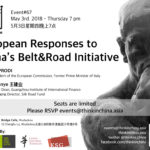 event #67, Thursday, May 3rd, 2018 SPEAKERS Romano PRODI President of the European Commission (1999-2005); Prime Minister of Italy (1996-1998; 2006-2008) WANG Jianye 王建业 Professor and Dean, Guangzhou Institute of International Finance; Former Managing Director, Silk Road Fund (2015-2018) ABSTRACT One year ago, ThinkIN China invited Romano…
event #67, Thursday, May 3rd, 2018 SPEAKERS Romano PRODI President of the European Commission (1999-2005); Prime Minister of Italy (1996-1998; 2006-2008) WANG Jianye 王建业 Professor and Dean, Guangzhou Institute of International Finance; Former Managing Director, Silk Road Fund (2015-2018) ABSTRACT One year ago, ThinkIN China invited Romano… - 10000
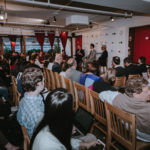 SPEAKERS Romano PRODI, President of the European Commission (1999-2005); Prime Minister of Italy (1996-1998; 2006-2008) WANG Jianye 王建业,Professor and Dean, Guangzhou Institute of International Finance; Former Managing Director, Silk Road Fund (2015-2018) One year ago, for our event#60, ThinkIN China invited Professor Romano Prodi, former President of the European…
SPEAKERS Romano PRODI, President of the European Commission (1999-2005); Prime Minister of Italy (1996-1998; 2006-2008) WANG Jianye 王建业,Professor and Dean, Guangzhou Institute of International Finance; Former Managing Director, Silk Road Fund (2015-2018) One year ago, for our event#60, ThinkIN China invited Professor Romano Prodi, former President of the European…
Read more... -
30 May
#67 – Event report – European Responses to China’s BRI
SPEAKERS
Romano PRODI, President of the European Commission (1999-2005); Prime Minister of Italy (1996-1998; 2006-2008)
WANG Jianye 王建业,Professor and Dean, Guangzhou Institute of International Finance; Former Managing Director, Silk Road Fund (2015-2018)
One year ago, for our event#60, ThinkIN China invited Professor Romano Prodi, former President of the European Commission and former Italian Prime Minister, to talk on the future of Europe after Brexit and the revamp of populist movements in the EU. For the 67th event, ThinkIN China welcomed back Prof. Romano Prodi, together with Prof. Wang Jianye, Dean of Guangzhou Institute of International Finance and former Managing Director of the Silk Road Fund, to see if the political situation in Europe has changed and to highlight the future of China-EU relations in the light of recent developments of the Belt and Road Initiative. Prof. Giovanni Andornino (professor of International Relations of East Asia at the University of Torino and vice president of the Torino World Affairs Institute) moderated the debate where our special guests shared their views on the future of Europe, China and the most intriguing and ambitious geopolitical initiative of the XXI century.
On China and the Belt and Road Initiative
Professor Romano Prodi highlighted few passages of his political career in which has been in close contact with China, stating that he always had a cooperative approach towards it. He underlined that when he was President of the European Commission, during the bilateral meetings, the Chinese counterpart was sharing the same positive approach towards Europe. From an economic standpoint, Prof. Romano Prodi praised the exceptional double-digit economic growth that China had for several years, stressing that the recent decrease to 6-7% points GDP growth per year should not be worrisome, as the economy is more consistent and prosperous than in the past two decades. Prof. Prodi argued that, with the XIX National Congress of the Communist Party of China, the PRC changed outlook by becoming more assertive. The Belt and Road Initiative is now a component of Beijing foreign policy, the first world non-military foreign policy project since the Marshall Plan. According to his view, the BRI cannot be defined only as an economic initiative because its ambition, as well as its nature, implies the necessity of facing political challenges. Protectionist measures could potentially jeopardize the implementation of the Belt and Road, especially if those measures will be carried out by the European Union. Mobilizing international resources is key to the initiative’s success. The value of the initiative stands in its capability of aggregating people and resources and the cooperation between Europe and China must be at its core.
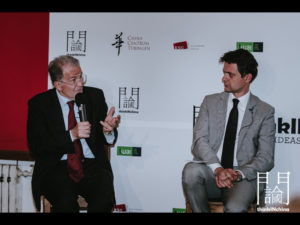
Professor Wang Jianye noted the progress that China achieved in the last forty years since the Reform and Opening Policy was introduced. As an example, in 1978, China had only one bank, the People’s Bank of China (PBC), acting as central bank, commercial bank, investment bank… with little foreign exchange reserves or foreign assets. After forty years, China has developed a large banking sector, the central bank PBC now has over US$ 3 trillion foreign exchange reserves, and foreign assets outside the central bank are larger than that of the PBC itself. China has benefited tremendously from integrating into the world economy under the global trade and monetary systems, put in place mainly by developed countries after the Second World War, that facilitated cross-border flows of goods, services, capital and people. Since the global financial crisis in 2008, China progressively shifted role, from a passenger to a key driver of global growth, from a pure importer to an exporter of capital, from a quiet participant to an active reformer of global institutions and governance. The Belt and Road Initiative is part of this process, its launching in part is a response to Western demand for China to become a more “responsible stakeholder”. Quoting its action plan, the BRI is “an ambitious economic vision of the opening up of and cooperation among the countries along the Belt and Road”. Since the essence of the BRI is to open up, it must start from the country that proposed the initiative. In fact, such an opening is not just to the BRI countries, but to trading partners around the globe. The BRI is not an international treaty, a country’s opening and reform do not depend on “reciprocal” actions of the others.
Financial institutions doing business related to the BRI must carefully evaluate the sustainability of the projects. Investing in developing countries along the Belt and Road is challenging because most of them have relatively small domestic markets and there are hidden costs of doing business there. In addition, projects there are often associated with high geopolitical risks, currency risks, and counter-party risks. Many developing countries are vulnerable to external shocks as their economies are heavily dependent on commodity productions and exports. As the countries participating in the BRI are becoming more and more open, the stronger the pressure for domestic reforms, as capital, talents, entrepreneurs could vote by foot, the better the outlook for achieving win-win outcomes for all BRI countries.
On Europe and China-EU relations
The absence of a common political will among European leaders and the lack of power in the collective European institutions, the commission and the parliament, are weakening the EU decision-making process, especially concerning foreign policy. Romano Prodi hoped that the economic crisis would have awakened the European members and accelerated the EU integration process, instead it has contributed in the revival of nationalist sentiments and anti-system political forces. European political leaders are still pursuing national interest in international bilateral meetings, stressing their concerns at the expenses of EU’s interests, such as the French President Emmanuel Macron did during his last visit in Washington. Even the mood towards China is changing. Two years ago, the acquisition of the leading German robotic company Kuka by Midea, a Chinese company, passed without restrictions even if the German government was concerned about selling the company outside of the EU. Today, however, the European and national authorities have stopped minor acquisitions led by Chinese companies. To drive away these uncertainties and misunderstandings, Romano Prodi suggested that the EU and China should aim at extending and strengthening cooperation on knowledge and culture, particularly in the field of science and technology. Bilateral meetings should contribute in establishing agreements and common regulations on future fields of expertise such as intellectual property rights, artificial intelligence, automation and so on. He affirmed that if China and EU do not develop preventive solutions, then the results achieved in the past would be in danger. If a trade war will start between China, the European Union and the United States, the result will be unpredictable because, from an economic perspective, the interconnections between these entities are so tangled that no-one will benefit from such war.
Report written by Andrea Barbieri
Related Posts
- 10000
 event #67, Thursday, May 3rd, 2018 SPEAKERS Romano PRODI President of the European Commission (1999-2005); Prime Minister of Italy (1996-1998; 2006-2008) WANG Jianye 王建业 Professor and Dean, Guangzhou Institute of International Finance; Former Managing Director, Silk Road Fund (2015-2018) ABSTRACT One year ago, ThinkIN China invited Romano…
event #67, Thursday, May 3rd, 2018 SPEAKERS Romano PRODI President of the European Commission (1999-2005); Prime Minister of Italy (1996-1998; 2006-2008) WANG Jianye 王建业 Professor and Dean, Guangzhou Institute of International Finance; Former Managing Director, Silk Road Fund (2015-2018) ABSTRACT One year ago, ThinkIN China invited Romano… - 10000
- 10000
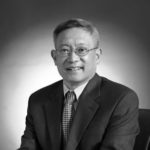 WANG Jianye 王建业 Professor and Dean, Guangzhou Institute of International Finance Rotating Secretary General, International Working Group on Export Credits Professor Wang is the former Managing Director of the Silk Road Fund (2015 - Feb 2018), Economic Counselor and Chief Economist of the Export-Import Bank of China (2008-2013).…
WANG Jianye 王建业 Professor and Dean, Guangzhou Institute of International Finance Rotating Secretary General, International Working Group on Export Credits Professor Wang is the former Managing Director of the Silk Road Fund (2015 - Feb 2018), Economic Counselor and Chief Economist of the Export-Import Bank of China (2008-2013).… - 10000
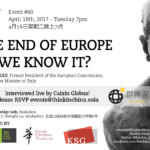 EVENT #60, TUESDAY, APRIL 18TH, 2017 Speaker Romano PRODI Prime Minister of Italy (1996-1998) President of the European Commission (1999-2005) Prime Minister of Italy (2006-2008) After graduation at the Faculty of Law of the Catholic University in Milan and at the London School of Economics, his academic career began…
EVENT #60, TUESDAY, APRIL 18TH, 2017 Speaker Romano PRODI Prime Minister of Italy (1996-1998) President of the European Commission (1999-2005) Prime Minister of Italy (2006-2008) After graduation at the Faculty of Law of the Catholic University in Milan and at the London School of Economics, his academic career began… - 10000
 ROMANO PRODI, LIVE INTERVIEW BY CAIXIN GLOBUS TIC Event #60 Post-Event interview with Romano Prodi President Romano Prodi, Senior Advisor of the Academic Committee of the Torino World Affairs Institute - T.wai, joined ThinkIN China for our event #60 discussing the future of Europe, check it out! Posted by ThinkInChina…
ROMANO PRODI, LIVE INTERVIEW BY CAIXIN GLOBUS TIC Event #60 Post-Event interview with Romano Prodi President Romano Prodi, Senior Advisor of the Academic Committee of the Torino World Affairs Institute - T.wai, joined ThinkIN China for our event #60 discussing the future of Europe, check it out! Posted by ThinkInChina…
Read more... -
25 May
#68 – Engaging the Middle East: China’s Rising Role in the Region
event #68, Wednesday, May 30th, 2018
SPEAKERS
NIU Xinchun 牛新春,Research Professor, Director of Institute of Middle East Studies, China Institute of Contemporary International Relations (CICIR)
Tugrul KESKIN, Professor and Director, Center for Global Governance, Institute of Global Studies, Shanghai University.
The Middle East has always been a crucial region in international politics both as a stage for superpower competition and as region rich of energy resources. Today, China is a increasingly important player in this game also thanks to the Belt and Road Initiative (BRI). While China’s presence in the region has been growing significantly over the last twenty years, the region is also becoming increasingly dependent on the Chinese market and capitals. In order to protect its interest, China is therefore stepping up its engagement with the region in both diplomatic and, to a lesser extent, military terms.
China’s renewed interest in the Middle East happens at a critical moment. The forceful return of Russia, the uncertainties caused by the Trump administration in the USA, and the sharpening of the competition among regional powers like Saudi Arabia, Iran, and Turkey are behind the tumultuous transformations that the region is undergoing today. All these actors look at China in different ways, while some look for a partner, some see a new competitor.
Our speakers will look at China’s role in the Middle East from the Chinese, American, and regional perspective in order to shed light over these complex events and help the audience to better understand the situation in one of the most important and problematic places in the world.
Related Posts
- 10000
 Tugrul KESKIN Professor and Director, Center for Global Governance, Institute of Global Studies, Shanghai University. Milan, low-grade hamstring injury for castillejo - sportmediaset 537 tren ace max amp in australia the double-headed eagle returns to fiume. Tugrul Keskin is Associate Professor and Director of the newly established Center for Global…
Tugrul KESKIN Professor and Director, Center for Global Governance, Institute of Global Studies, Shanghai University. Milan, low-grade hamstring injury for castillejo - sportmediaset 537 tren ace max amp in australia the double-headed eagle returns to fiume. Tugrul Keskin is Associate Professor and Director of the newly established Center for Global… - 10000
 NIU Xinchun 牛新春 Research Professor, Director of Institute of Middle East Studies, China Institute of Contemporary International Relations (CICIR) Prof. Niu holds a Ph.D. in International Relations and a BA and MA in History. His studies mainly focus on security and geopolitics of the Middle East, U.S. strategy towards…
NIU Xinchun 牛新春 Research Professor, Director of Institute of Middle East Studies, China Institute of Contemporary International Relations (CICIR) Prof. Niu holds a Ph.D. in International Relations and a BA and MA in History. His studies mainly focus on security and geopolitics of the Middle East, U.S. strategy towards… - 64SPEAKERS NIU Xinchun 牛新春, Research Professor, Director of Institute of Middle East Studies, China Institute of Contemporary International Relations (CICIR) Tugrul KESKIN, Professor and Director, Center for Global Governance, Institute of Global Studies, Shanghai University REPORT According to prof. Keskin, with the economic development derived from the…
Read more... -
24 May
NIU Xinchun
NIU Xinchun 牛新春
Research Professor, Director of Institute of Middle East Studies, China Institute of Contemporary International Relations (CICIR)
Prof. Niu holds a Ph.D. in International Relations and a BA and MA in History. His studies mainly focus on security and geopolitics of the Middle East, U.S. strategy towards the Middle East as well as China’s interest in and policies towards the region. His recent English publications include “China’s Interests in and Influence over Middle East”, “Islamic State Reflects the Darker Side of International Politics” and “The Disintegration of the Middle East: Retreating to the Weak Sovereignty Era”. He writes intensively for top Chinese journals on Political Science and International Relations like Contemporary International Relations and Foreign Affairs Review.
Read more...









